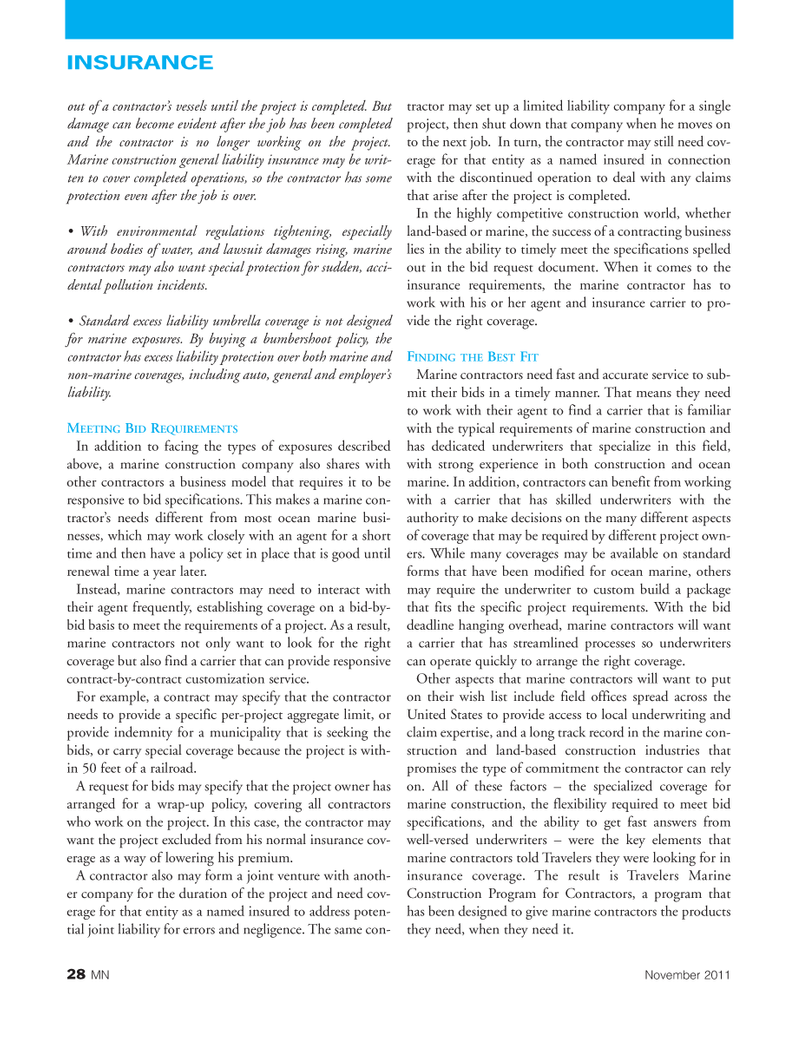
Page 28: of Marine News Magazine (November 2011)
Workboat Annual
Read this page in Pdf, Flash or Html5 edition of November 2011 Marine News Magazine
28MNNovember 2011out of a contractor?s vessels until the project is completed. But damage can become evident after the job has been completedand the contractor is no longer working on the project. Marine construction general liability insurance may be writ- ten to cover completed operations, so the contractor has some protection even after the job is over. With environmental regulations tightening, especially around bodies of water, and lawsuit damages rising, marine contractors may also want special protection for sudden, acci- dental pollution incidents.Standard excess liability umbrella coverage is not designed for marine exposures. By buying a bumbershoot policy, the contractor has excess liability protection over both marine and non-marine coverages, including auto, general and employer?s liability. MEETINGBIDREQUIREMENTS In addition to facing the types of exposures described above, a marine construction company also shares with other contractors a business model that requires it to be responsive to bid specifications. This makes a marine con- tractor?s needs different from most ocean marine busi- nesses, which may work closely with an agent for a short time and then have a policy set in place that is good until renewal time a year later. Instead, marine contractors may need to interact with their agent frequently, establishing coverage on a bid-by- bid basis to meet the requirements of a project. As a result, marine contractors not only want to look for the rightcoverage but also find a carrier that can provide responsive contract-by-contract customization service. For example, a contract may specify that the contractor needs to provide a specific per-project aggregate limit, or provide indemnity for a municipality that is seeking the bids, or carry special coverage because the project is with- in 50 feet of a railroad. A request for bids may specify that the project owner has arranged for a wrap-up policy, covering all contractors who work on the project. In this case, the contractor may want the project excluded from his normal insurance cov- erage as a way of lowering his premium. A contractor also may form a joint venture with anoth- er company for the duration of the project and need cov- erage for that entity as a named insured to address poten- tial joint liability for errors and negligence. The same con- tractor may set up a limited liability company for a singleproject, then shut down that company when he moves on to the next job. In turn, the contractor may still need cov- erage for that entity as a named insured in connection with the discontinued operation to deal with any claimsthat arise after the project is completed. In the highly competitive construction world, whether land-based or marine, the success of a contracting businesslies in the ability to timely meet the specifications spelledout in the bid request document. When it comes to the insurance requirements, the marine contractor has to work with his or her agent and insurance carrier to pro- vide the right coverage. FINDINGTHE BESTFITMarine contractors need fast and accurate service to sub- mit their bids in a timely manner. That means they need to work with their agent to find a carrier that is familiar with the typical requirements of marine construction and has dedicated underwriters that specialize in this field, with strong experience in both construction and ocean marine. In addition, contractors can benefit from working with a carrier that has skilled underwriters with the authority to make decisions on the many different aspects of coverage that may be required by different project own- ers. While many coverages may be available on standard forms that have been modified for ocean marine, others may require the underwriter to custom build a package that fits the specific project requirements. With the bid deadline hanging overhead, marine contractors will want a carrier that has streamlined processes so underwriters can operate quickly to arrange the right coverage. Other aspects that marine contractors will want to put on their wish list include field offices spread across the United States to provide access to local underwriting and claim expertise, and a long track record in the marine con- struction and land-based construction industries that promises the type of commitment the contractor can rely on. All of these factors ? the specialized coverage for marine construction, the flexibility required to meet bid specifications, and the ability to get fast answers from well-versed underwriters ? were the key elements that marine contractors told Travelers they were looking for in insurance coverage. The result is Travelers Marine Construction Program for Contractors, a program that has been designed to give marine contractors the products they need, when they need it. INSURANCEMN#11 (18-31):MN 2011 Layouts 10/27/2011 9:29 AM Page 28

 27
27

 29
29
